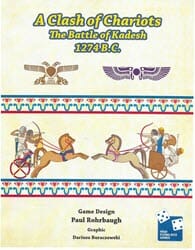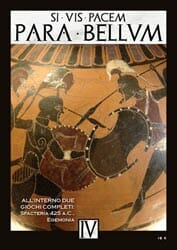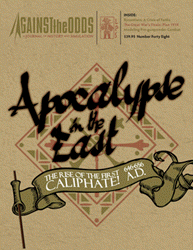- A Clash of Chariots (new from High Flying Dice Games)
The Battle of Kadesh, 1274 BCE. The fortress of Kadesh, near the Orontes river, was the first major obstacle the Egyptians faced, but their spies assured them only the Hittite garrison and a few scattered local troops were located there. Pharaoh had divided his army on the approach march to use multiple wells along the frontier, and to save his men from the effects of marching through clouds of dust such a huge host would raise. [Forum]
- Blocking Xerxes’ Invasion 480 BC
- Peloponnesian War 431–404 BC
- Pericles: The Peloponnesian Wars Replay
- Hannibal and Hamilcar PBEM Tournament
- Histomap: Visualizing the 4,000 Year History of Global Power
- Falling Sky Replay
- Falling Sky: The Gallic Revolt Against Caesar Review
- Ariovistus: Falling Sky Expansion Unbagging [video]
- Quartermaster General: The Peloponnesian War Replay
- Hittites, Assyrians, Amurru, and Ahhiyawa
- Rome: the Power…
- Soldier and Warrior
- PARA BELLUM, Issue 4 (new from ACIES Edizioni)
- Etruscan-Roman Wars
- The Battle of Red Cliffs
- Against the Odds, Issue 48: Apocalypse in the East (new from LPS Inc.)
featured insert game looks at the rise of the "First Caliphate" under Syrian rule and its conflicts with a declining Byzantine empire. The game spans competed territory from Egypt to the Dardanelles. Issue #48 also includes a bonus game, "Balck Friday," looking at a small-but-key battle during the Soviet counterattack outside Stalingrad. [Forum]
- Falling Sky 2nd Edition + Ariovistus Review
- Pericles: The Peloponnesian Wars Replay
- Falling Sky: The Gallic Revolt Against Caesar Replay


